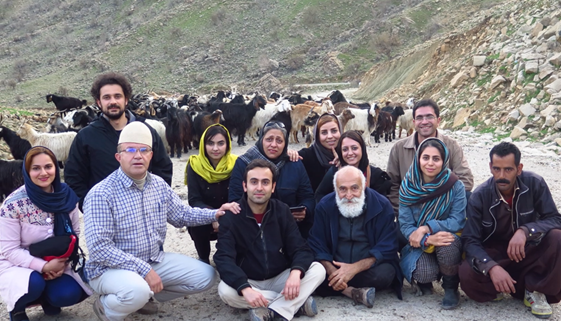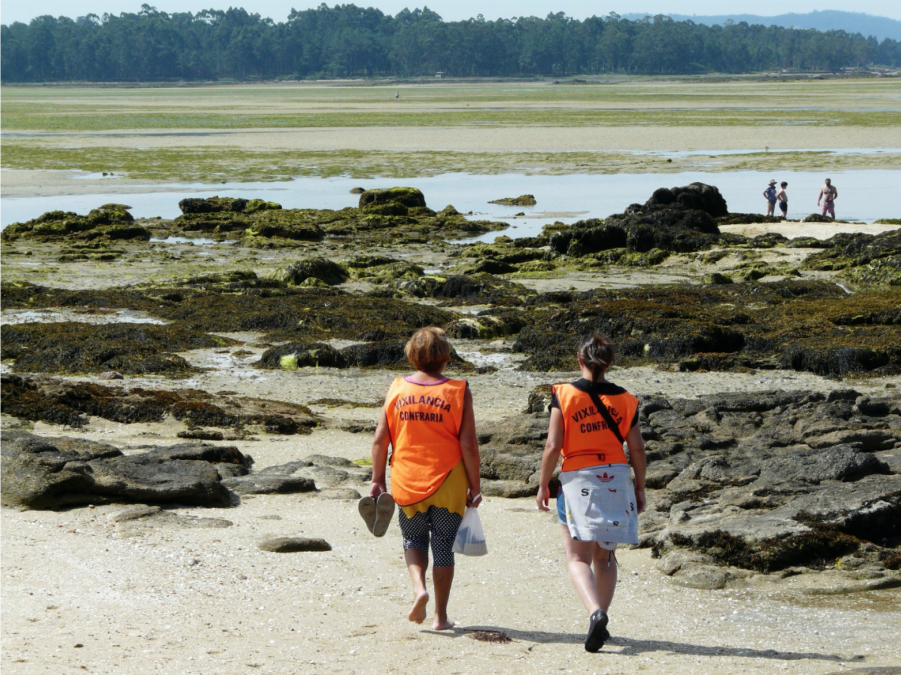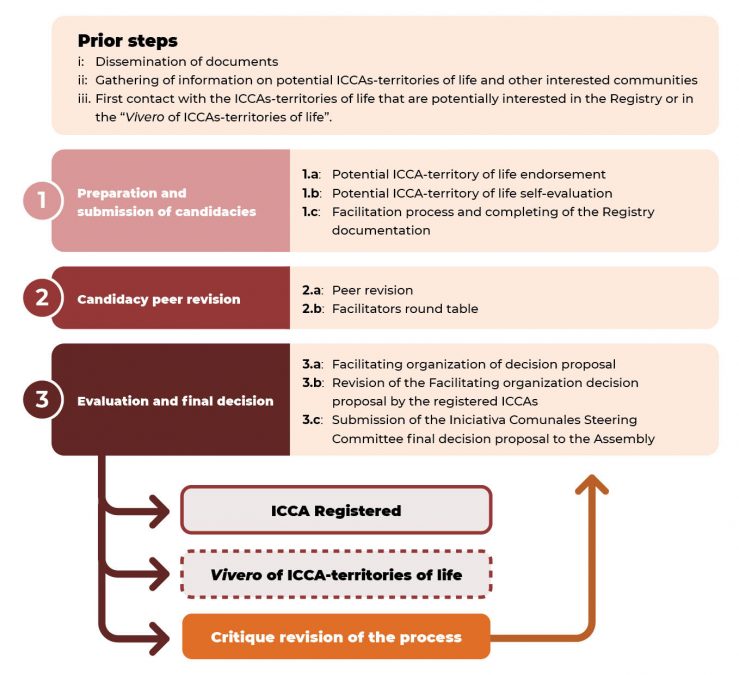
Peer support and review: See how others do it!
No uniform method can be applied for peer support and review processes. National ICCA networks and facilitating organizations should adapt and experiment with what works best for them. Relevant experience exists, among others, in the Philippines, Ecuador, Colombia, Indonesia, and China. See below for more information about the peer support and review processes in Iran and Spain.
The peer-support and review process in Iran
A four-step process has been outlined by UNINOMAD, which is the Union of Indigenous Nomadic Tribes of Iran, in collaboration with Cenesta, which is the Centre for Sustainable Development and Environment.
- In the first step, the communities themselves carry out three assessments:
1) a territorial assessment, involving participatory mapping of their territory of life;
2) an ecological assessment, involving adding ecological assets to the maps, current ecological trends and all indigenous knowledge they consider relevant; and
3) a governance assessment, involving identification of the customary governance institution and—if necessary— steps towards strengthening it.
- In the second step if the results of the three assessments reveal that the area can be considered an ICCA—territory of life, then the community takes a free, prior, and informed decision to self-recognize it as such; it then sends its documentation of the territory of life to UNINOMAD for eventual comments and questions.
- In the third step, when all the comments and questions are solved, UNINOMAD submits the documentation and any further information to the National Registry of ICCAs in Iran, which is maintained by Cenesta.
- In the fourth and final step, Cenesta prepares the documentation for inclusion in the international ICCA Registry and/or WDPA. At this point, the information is also sent to relevant government agencies, for their information and for inclusion in reporting on international agreements.

A visit by Cenesta to support step one of the peer support and review process. Photo: Cenesta
The peer-support and review process in Spain
In 2015, Iniciativa Comunales drafted the first “Protocol for the peer review of the candidacies to the ICCA Registry in Spain”. Iniciativa Comunales is an association of local communities who collectively govern natural resources, representing thousands of commoners in Spain. Other members include supporting organizations and concerned individuals. In 2017, the two first communities were registered in the ICCA Registry and, by 2020, six registration processes were completed and some more initiated. The current version of the protocol was approved in 2019 (download in Spanish).
From the beginning, there was a strong consensus among the communities about the need to guarantee the quality of the registry. To avoid “false positives”, it was paramount that the process ensured that the registered territories possessed the three characteristics of ‘territories of life’: 1) a strong bond between a community and the territory; 2) a well-functioning governance institution and 3) resulting nature conservation and contributions to livelihoods and wellbeing.

Watchwoman of a shellgathering community in Galicia. Photo: iComunales.
Why is it needed?
To better understand the communities’ concerns about the quality of the Registry, is important to mention that in Spain there are many areas governed by communities (e.g. “commons”); however, in some cases effective community governance is almost non-existent due to cultural erosion, emigration and over-ageing population. Some of these communities sign agreements by which external actors (usually companies) govern the area’s natural resources under their own market criteria for a period of years. This has serious impacts on local governance, conservation goals and other social and livelihood uses of the territory. For example, under these agreements huge common areas are typically planted with monocultures of Eucalyptus, an exotic invasive species – for logging on a short-term economic basis. Consequently, communities lose their daily governance practices, and their attitude shifts from a complex and culturally rich relation to the territory, to one of merely seeking revenue.
If the Registry would include these cases as bona fide territories of life it would incorporate “false positives” and diminish both the value of the Registry and the capacity of the registered communities to use it as an advocacy tool. For this reason, communities agreed to receive external, anonymous comments and questions from members of two other communities for a “revision report”. These reports are confidential, and our experience is that constructive criticism by peers can be a strong driver for internal strengthening of community processes.
How does it work?
Candidate communities agree to go through a participative peer support and revision process, based on:
- The information provided by the candidate communities in the official forms of UNEP-WCMC (the ICCA Registry managing entity) and of Iniciativa Comunales (the facilitating organization).
- The revision peer reports from two anonymous commoners from other communities.
- Any other relevant information provided by the candidate community or others.
This process is facilitated by Iniciativa Comunales. Once the information and revision reports are complete, the Iniciativa Comunales Steering Committee brings a reasoned opinion about the candidacies to the general assembly of the association. The final decision is then to be taken by all members collectively (by the association rules, votes by non-community members, including individuals, CSOs, research centres, etc., cannot exceed 40% of the total).
The protocol guides this process; and as needs arise, the protocol is reviewed and revised. Proposed changes are debated regularly, to be approved by the assembly. The protocol also foresees a peer revision of all registered ICCAs every five years.
Lessons learnt
- Many communities, including obvious candidates, do not see the Registry as an interesting opportunity, as it ‘only’ provides recognition. Something more is needed.
- A transparent peer review process is challenging; it needs a strong commitment of ICCA Network members (which is there for Spain), or a major budget (not there for Spain); in all cases, it needs a lot of time and experienced, responsible people. There are scant previous references and it is difficult to strike a balance, between “keeping it simple” and developing a reliable system that takes into account the needs of everyone involved and avoid collective exhaustion. We are worried about this and are exploring new approaches to improve the process resilience.
- There are serious limitations of a “medal system” which is focusing only on the most emblematic examples of territories of life. This can have the perverse outcome of promoting elitism. A binary “yes/no” answer to the question “is this a territory of life?” excludes most cases, based on a static picture in a given moment, ignoring current efforts, processes or trends.
- A Registry based on this approach has a limited transformative capacity. A new, integrative approach is needed, to provide appropriate recognition and support to any community seeking inclusion in the Registry – irrespective of its current qualification as an ICCA or not. We are working on this approach right now, which we call the Vivero (“plant nursery” in Spanish, see figure below).
- A mechanism should be in place to constructively integrate disagreements. Good will and “fair play” should not be taken for granted. We should rather take the best from constructive disagreement but prevent and counter destructive positions and actions.
- A clearly defined governance system should be in place, including a trusted board for solving disputes and taking final decisions, and a policy to avoid conflict of interests. To limit the concentration of power, this board should be accountable to a wide representation of communities which are potential candidates for the Registry. Its decisions should be subject to “appeal” and its composition subject to “contestation”.
- All participants should explicitly agree to comply with the established common rules.
- Attention should be paid to imbalances in the geographical and sectorial characteristics of the candidates for the Registry because they can lead to distortions in the power of representation: if certain regions or sectors (e.g., forestry, irrigation, fisheries) dominate the view on what a territory of life is and should be, others may be excluded. We initially failed to foresee this but are learning to improve.

Thoughts on the future approach for the ICCA Registry
We are working to build a constructive and collective process to support all communities willing to strengthen the three key characteristics of their territories of life, irrespective of how strong each of them is at a given moment, or whether they are interested in the Registry or not. In this support process, the Registry should not be a short-term goal, but one of the many tools to improve the ICCA characteristics of a given territory as part of a long-term approach.
To articulate this process we propose the “Vivero de ICCAs“, (”ICCA plant nursery”): instead of a “yes-or-no-decision” (either you deserve recognition or are discarded), attention would be given to a progressive scale of thresholds for challenges and achievements in each of the three characteristics, and the processes and trends a community is promoting. This would also be an opportunity for the already registered ICCA communities to share their experiences and help others to improve governance systems, conservation strategies and other aspects, while continuing to learn and strengthen their own territories of life – in the true sense of “peer support”.
Prepared by Iniciativa Comunales; for further information, write to: hola@icomunales.org